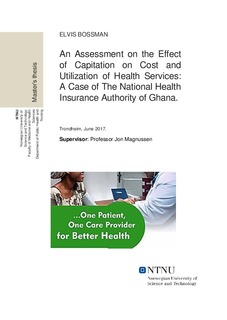| dc.description.abstract | It is common knowledge that responsiveness towards healthcare utilization, cost of service delivery in terms of cost containment may be influenced by the method of reimbursing service providers. Most often it has the hypothesis is that, capitation form of reimbursement reduces cost of drugs and services, checks over prescription, unnecessarily referral which in the long run leads to over utilization of services. The aforementioned, if left unchecked culminates in escalating cost of health care. To assess the impact of capitation as a provider payment method in the operations of the National Health Insurance Authority of Ghana. We use data categorized under two main groups; the capitated group and the non-capitated group to examine the impact of the capitation policy on health service utilization and expenditure in the outpatient department. The study employed difference-in-difference approach in analyzing the difference in the trends before and after the introduction of the capitation policy. Multiple linear regression model was used to estimate effects on cost per member and utilization per member between the two groups and the two periods.
Findings from the study reveals that, there was a general decline in the in OPD cost per member and OPD utilization per member at result of the capitation policy. Evidence from the study indicates that enrollees in the Ashanti region which represent the capitated group significantly consumed less health services per member by 1.793 units as compared to the Brong-Ahafo region (non-capitated group). Although the capitation coefficient on OPD cost per member indicated a decline, evidence from the results shows that the decline was not statistically significant. In conclusion, there was a considerable evidence to reject the claim that there is statistically significant difference between OPD utilization per member between the capitated and the noncapitated group before and after the introduction of the capitation policy. In contrast to the study hypothesis, it failed to reject the null hypothesis that trend between the two groups within the two period has no different effect on the cost of services per member because of the capitation policy. Access to data and the use of data on cost which was not adjusted for inflation were the limitations that challenged the study. | nb_NO |
